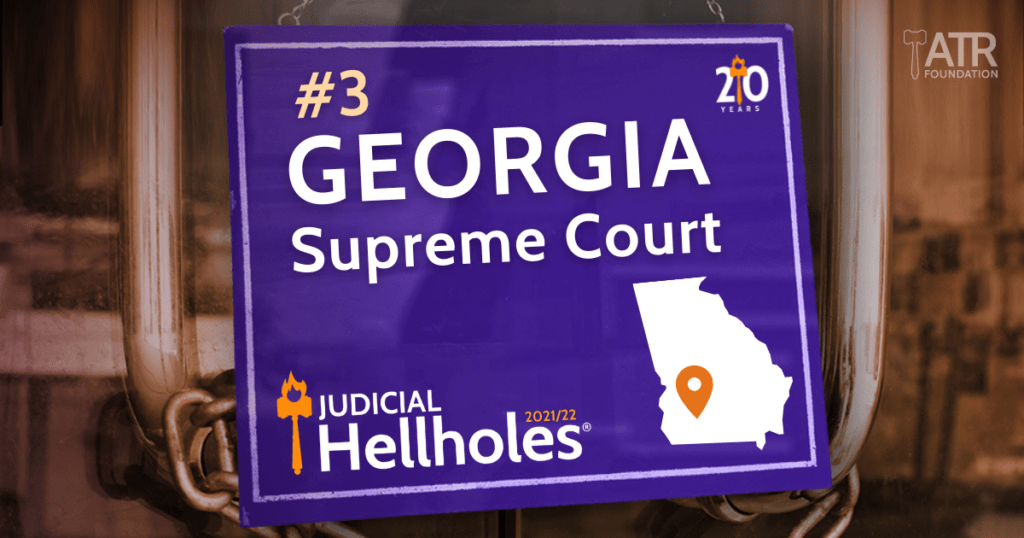‘Highly Unusual’ Rehearing of Louisiana Case Raises Judicial Independence Concerns
Louisiana Supreme Court Waffles Under Political Pressure, ATRA Brief Urges Court to Stand Strong

State Supreme Court’s penchant for
liability expansion a major contributing factor
Georgia’s Supreme Court is the third worst “Judicial Hellhole®” in the country, according to a new report.
The American Tort Reform Foundation (ATRF), in its 20th anniversary edition of the annual report, bumped the state’s high court up the list from where it sat in sixth place for the past two years. Significant deterioration in Georgia’s civil justice system propelled the “Peach State” to its highest-ever ranking on the Judicial Hellholes® list.
This year, the Georgia Supreme Court eliminated apportionment of fault in certain cases and expanded bad faith liability for insurers, as well as its jurisdiction over out-of-state defendants.
ATRF further reports that Georgia’s reputation for nuclear verdicts continues, while third-party litigation financing is playing an increasing role in litigation.
“The decline of Georgia’s civil justice system is somewhat surprising and disheartening,” American Tort Reform Association President Tiger Joyce said. “The state was on the Judicial Hellholes® Watch List for a number of years, and the legislature has made some attempts at improvement, but sadly the Supreme Court has continued to make decisions that expand liability and create a toxic environment for small businesses.”
If certain reforms were enacted in Georgia, state residents and businesses could save more than $3 billion. These annual savings could support more than 38,200 additional jobs and $6.24 billion in increased economic activity.
In August, the Georgia Supreme Court ruled in Alston Bird LLC v. Hatcher Management Holdings that juries may no longer apportion fault in single-defendant civil cases. According to the ATRF report, this means that an individual or business can be required to pay a plaintiff’s entire damage award if it is the only one sued, even if others were at fault.
“Unfortunately, the Alston decision creates another path for trial lawyers to target perceived deep-pocketed defendants in an attempt to get a big payday for themselves,” Joyce said. “This series of liability-expanding decisions coming out of the Georgia Supreme Court will negatively impact businesses in the state for years to come if they’re left unchecked.”
ATRF cited four areas in which the Georgia Supreme Court issued liability-expanding rulings this year: bad faith insurance claims; jurisdiction; employment liability and workers’ compensation; and, sufficient notice of claims.
This summer, the Georgia Court of Appeals found that a worker who suffered an injury during her lunch break is eligible for benefits under Georgia’s workers’ compensation law. The ruling relied on 2020’s Frett decision out of the Georgia Supreme Court.
“These rulings provide a glimpse into the future of workers’ compensation laws in Georgia, where employees can seek workers’ comp coverage for injuries suffered during scheduled breaks,” Joyce said.
While liability grows in the state, so do the size of its verdicts. “Nuclear” verdicts are multi-million-dollar awards, which ATRF says typically result from a trial lawyer urging the jury to return a specific, extraordinary amount and misleading them to think that level is the norm. In August, a Rabun County jury awarded a record-breaking $200 million verdict in a wrongful death case against a boating company. The verdict was the largest in the county’s history and the largest single verdict for noneconomic damages in a wrongful death case in Georgia history.
“While these are of course terrible accidents that we wouldn’t wish upon anyone, these nuclear verdicts will likely only bankrupt companies that are providing good-paying jobs in the community,” Joyce said. “The Georgia Supreme Court must rein in these nuclear verdicts and stop expanding liability – it incentivizes lawyers to go after high-dollar verdicts.”
ATRF reports that on a positive note, the Georgia Supreme Court is determining whether to adopt the “apex doctrine,” a framework implemented by courts across the country to avoid the deposition of high-ranking corporate officials who do not have firsthand knowledge of the issue involved.
“It is critically important that executives are free to advance a beneficial corporate culture without fear of being subjected to deposition simply because of their job title when they have no direct involvement in, or superior knowledge of a given lawsuit,” Joyce said. “Deposition of high-level executives should be reserved for when it is truly needed for the pursuit of justice, rather than an unjust attempt to gain an unwarranted litigation advantage irrespective of the facts.
The Georgia Supreme Court is one of eight Judicial Hellholes® in the 2021-2022 report:
Judicial Hellholes® are deemed the most unjust local courts and state civil justice systems in the country. Read the full report at JudicialHellholes.org.
Louisiana Supreme Court Waffles Under Political Pressure, ATRA Brief Urges Court to Stand Strong
Left unchecked, these jurisdictions will continue dragging down economic growth and undermining justice through rampant lawsuit abuse.
Claimants Given Opportunity to Vote on Plan; Judge to Reconsider Scientific Validity of Plaintiffs’ Experts
Legitimate consumer protection demands sound science and impartial analysis — not distorted data designed to manufacture lawsuits.
Law Firms Spent $168M+ on 2.2M Ads in Georgia
ATRA’s Latest Studies Reveal Financial Influence and Lack of Transparency in Pennsylvania’s Campaign Finance Systems